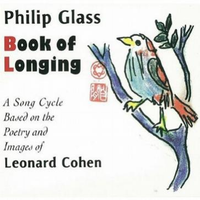
Book of Longing
In May 2006, Leonard Cohen published his first collection of poetry in 22 years, Book of Longing, having previously used some of the material as songs on his most recent albums, Ten New Songs (2001) and Dear Heather (2004). The book touched on many of the themes he had explored throughout his writing career, including spiritualism (he had spent part of his time between books as a postulant at a Buddhist monastery), eroticism, and self-deprecating humor. On June 1, 2007, at the Luminato Festival in Toronto, Ontario, composer Philip Glass premiered his song cycle based on Book of Longing, which is here given a two-CD recording. Cohen is present on the album speaking (not singing) some of his poems, and Glass also has set some of them to music, with singing by a soprano (Dominique Plaisant), a mezzo-soprano (Tara Hugo), a tenor (Will Erat), and a bass-baritone (Daniel Keeling). The obvious antecedent is Glass' 1986 album Songs from Liquid Days, which set lyrics by the likes of Paul Simon and Suzanne Vega, but perhaps a closer one is Cohen's album Death of a Ladies' Man (1977), his collaboration with Phil Spector. It's not that Book of Longing ever sounds like Death of a Ladies' Man, but the similarity lies in the mixture of two distinct styles. For better or worse, Death of a Ladies' Man sounds like what one would expect of the unlikely mixture of Cohen's droll, deep-voiced singing with Spector's elaborate production style, and Book of Longing is, as one might expect, a fusion of Cohen's poetic voice with Glass' distinctive circular rhythmic motifs. It is actually somewhat more respectful of the text than Songs from Liquid Days, although listeners still may find it odd to hear art songs in which Cohen's sometimes R-rated language is sung in a formal style by classically trained voices. These selections alternate with a series of tracks, notably "Not a Jew," "I Enjoyed the Laughter," "Don't Have the Proof," and "I Am Now Able," in which Cohen (without any musical backing) recites a very short poem either before or after a solo by an individual instrument (oboe, violin, saxophone, and cello, respectively). Fans of Ten New Songs and Dear Heather will hear some familiar phrases and references (e.g., "a thousand kisses deep" is the tag line of "You Came to Me This Morning," as it is of the song "A Thousand Kisses Deep"), although no complete song/poem has been repeated. Cohen may still be at his best as his own interpreter, but this is one of the more interesting and ambitious attempts to recast his writing in musical form.
